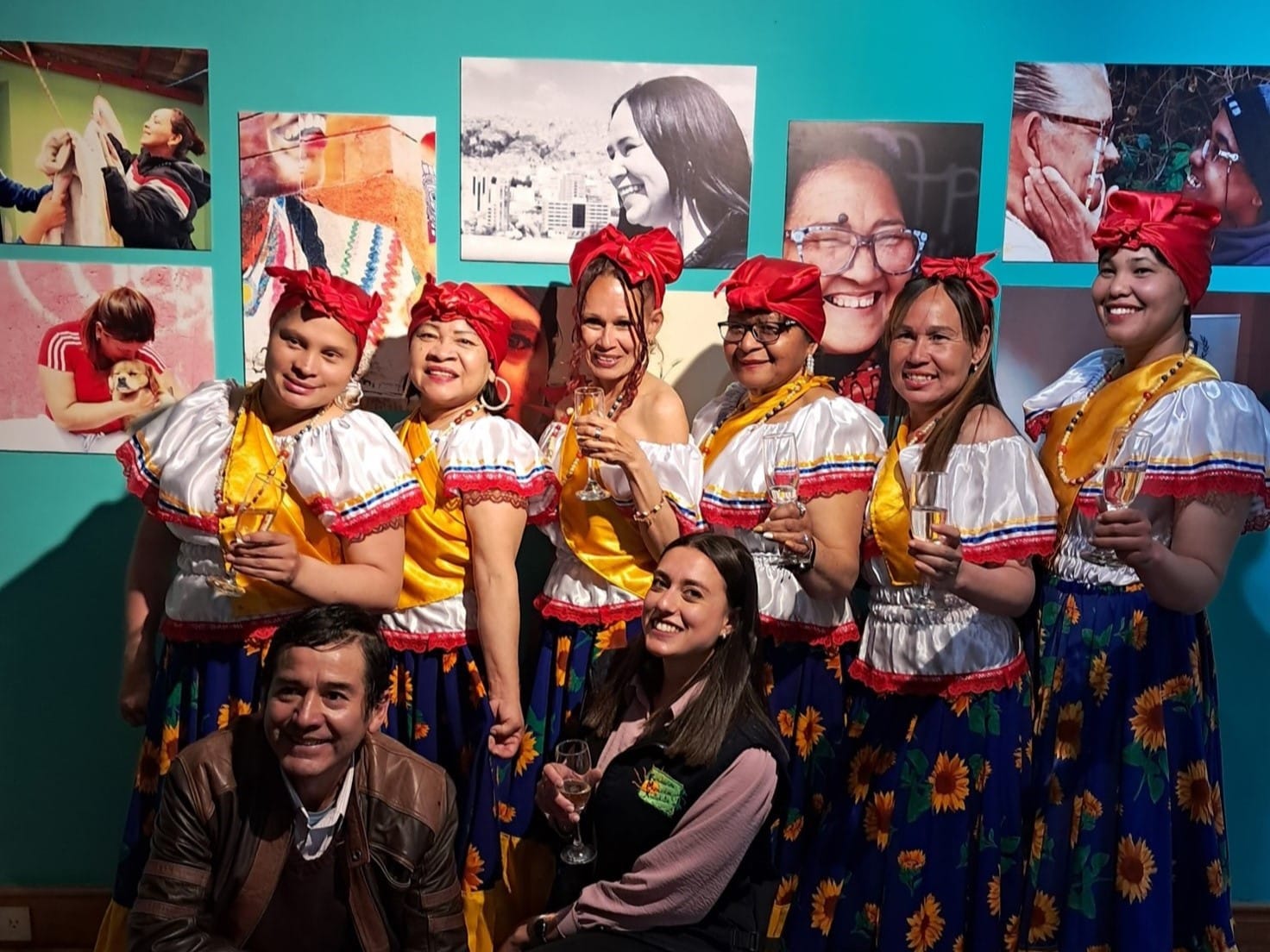Le volontariat humanitaire – au-delà de la mission : quand les volontaires initient le changement social
Au-delà des tâches prédéfinies au sein de l'organisation, le Corps Européen de Solidarité (CES) volet "aide humanitaire" encourage les volontaires à initier un projet personnel, libre, mais en lien avec les enjeux locaux ou la promotion du volontariat. Ces initiatives répondent aux besoins des communautés tout en développant les compétences en gestion de projet des volontaires. Retour sur trois projets de volontaires : Marta, Giulia C. et Giulia P.
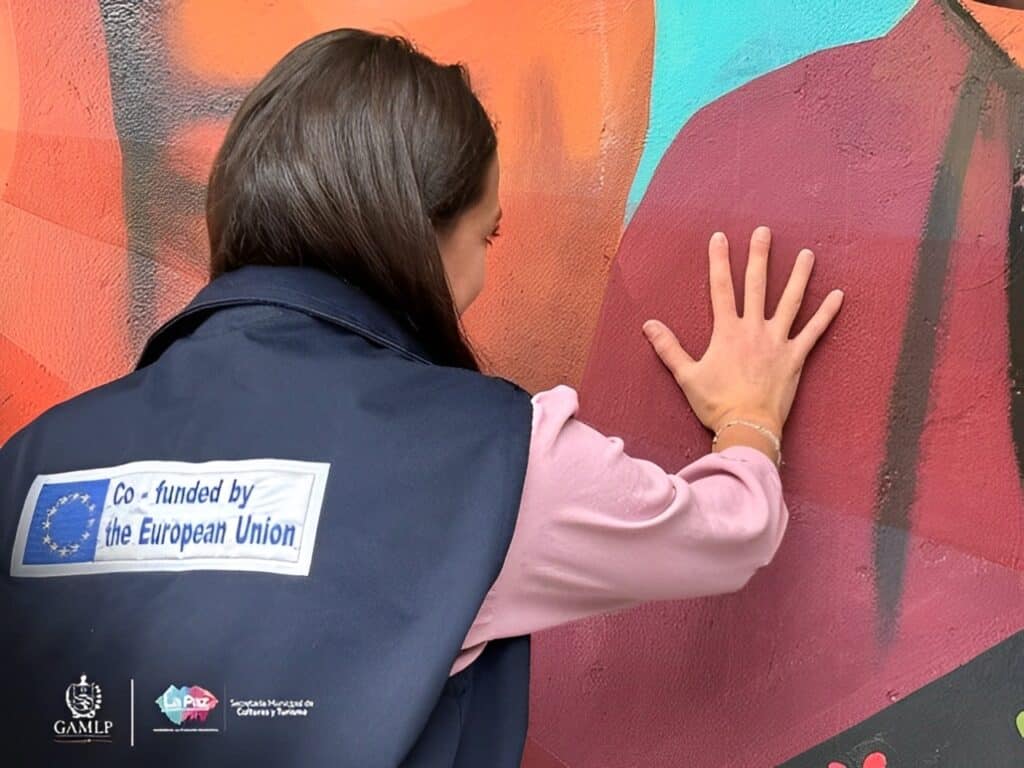
Le volontariat, un espace d’initiative et d’expérimentation
Dans le cadre du programme CES humanitaire, chaque volontaire a l’opportunité de proposer un projet personnel, en complément de sa mission initiale. Ces projets doivent non seulement s’adapter aux réalités locales et répondre aux besoins des communautés, mais aussi promouvoir le volontariat et l’autonomisation des populations.
Marta, Giulia C. et Giulia P. ont été déployées à travers l’initiative INTERVOLUNTEER (un programme axé sur le leadership des femmes pour la paix et le développement dans les communautés locales), et ont profité de cette opportunité pour lancer des projets marquants, combinant innovation, impact social et développement personnel. Voici comment elles ont contribué à transformer les communautés qu’elles ont accompagnées.
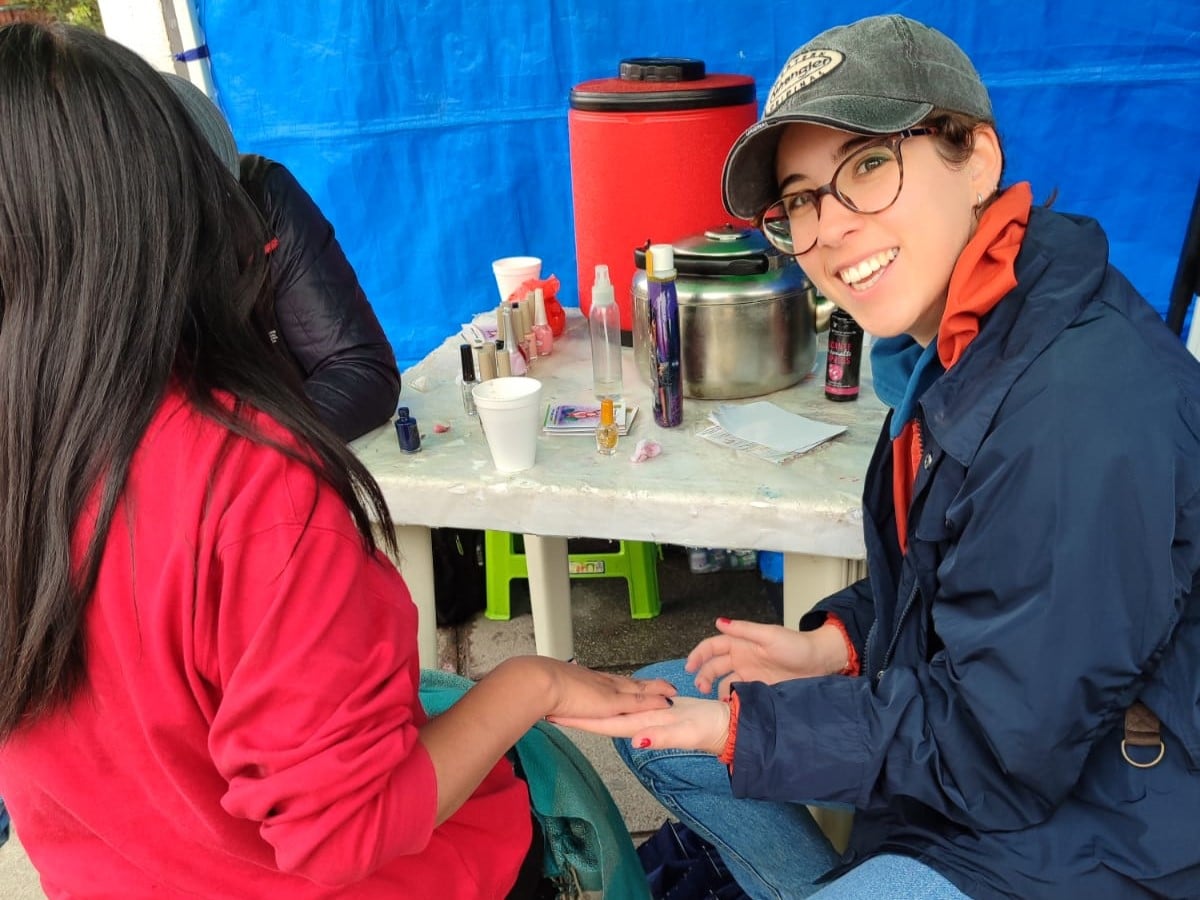
Marta et le film d’animation : sensibiliser à travers la narration
Marta, volontaire en Bolivie à la Fundación Munasim Kullakita, a conçu un film d’animation inspiré des parcours de jeunes filles victimes de violences et de traite. Ce projet visait à sensibiliser la communauté aux réalités souvent invisibles de ces jeunes femmes, tout en valorisant le travail de la fondation qui leur offre un accompagnement psychologique, éducatif et social. L’animation a permis non seulement de sensibiliser un large public mais aussi de donner une voix aux survivantes, illustrant ainsi la force du récit comme outil de changement social.
Giulia C. et l’art comme levier d’inclusion
Giulia a utilisé l’art mural et la photographie pour promouvoir l’inclusion des femmes migrantes et locales. En collaboration avec des artistes et des habitantes de La Paz, elle a co-créé un mural intitulé Mujeres entrelazadas, tejiendo historias, mettant en avant la force et la diversité des femmes. Ce projet a non seulement permis de sensibiliser à la place des femmes dans la société, mais aussi de renforcer leur estime de soi à travers l’expression artistique. En parallèle, une exposition photographique a permis de raconter les parcours de ces femmes, rendant visibles des trajectoires souvent méconnues.
Giulia P. et le comics éducatif : donner une voix aux enfants des rues
Travaillant auprès des enfants vivant dans la rue à El Alto, Giulia P. a conçu une bande dessinée racontant l’histoire d’un jeune garçon confronté aux défis de la vie urbaine. Cet outil pédagogique a été utilisé pour sensibiliser les enfants et adultes aux réalités de la précarité infantile, tout en valorisant les ressources et les solutions mises en place par la fondation pour accompagner ces jeunes vers une meilleure qualité de vie.
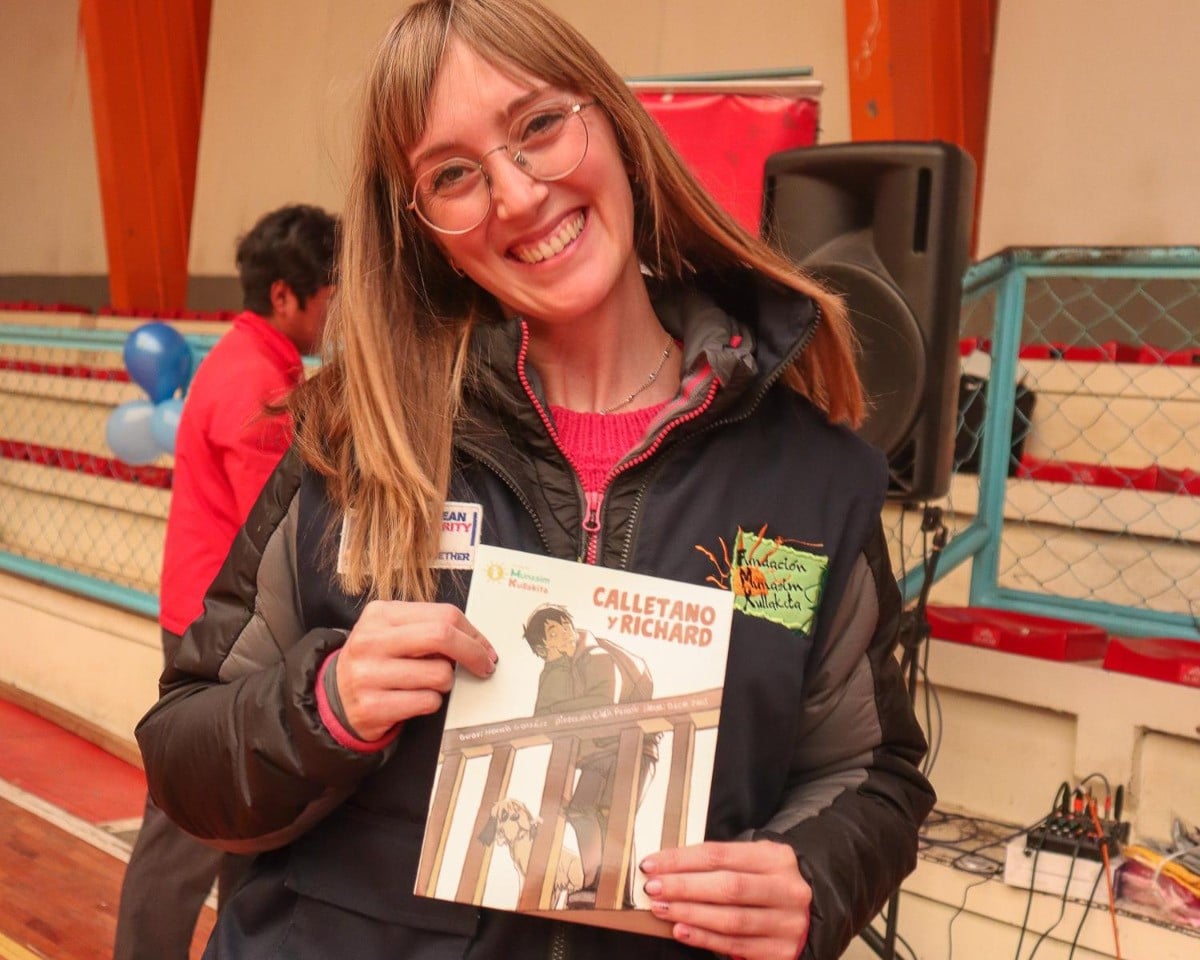
Un impact durable pour les volontaires et les communautés
Ces projets illustrent comment les volontaires, en prenant des initiatives, participent activement au changement social. Au-delà de leurs missions principales, ils développent des compétences en gestion de projet, apprennent à travailler en collaboration avec des acteurs locaux et contribuent à des actions qui perdurent après leur départ. Ces initiatives renforcent également les capacités des communautés locales, en leur donnant des outils et des espaces d’expression adaptés à leurs besoins.
L’impact des volontaires est également mesurable à travers des données concrètes :
- Par exemple, le travail de Giulia P. dans les carpas de escucha (espaces d’écoute en plein air) a permis de fournir une orientation psychologique à plus de 300 personnes en situation de vulnérabilité. À travers l’Aula Móvil (salle de classe mobile), 628 enfants et adolescents ont bénéficié d’un accompagnement éducatif et psychosocial, favorisant ainsi leur développement personnel et social. Son projet du comic Calletano y Richard, a eu un impact sur la sensibilisation des jeunes vivant en situation de rue et continue d’être utilisé comme outil pédagogique.
- Quant à Marta, son travail d’accompagnement psychologique dans le foyer de Munasim Kullakita a concerné 12 cas individuels, contribuant à la reconstruction de projets de vie pour ces jeunes filles.
- Giulia C., quant à elle, a contribué à l’inclusion et à l’expression des femmes migrantes et locales, à travers ses initiatives artistiques qui ont encouragé la participation communautaire et l’empowerment féminin.
Les témoignages des volontaires confirment que cette expérience a été transformative pour elles-mêmes. Marta souligne combien travailler auprès des jeunes filles lui a permis de développer une résilience et une capacité d’écoute précieuses. Giulia C. explique que l’échange avec les femmes migrantes lui a donné une perspective nouvelle sur les enjeux sociaux liés à la migration et à l’inclusion. Pour Giulia P., son engagement auprès des enfants de la rue a renforcé son désir de s’investir dans des projets sociaux et éducatifs à long terme.
Les témoignages recueillis dans l’organisation d’accueil soulignent également que la présence des volontaires apporte un enrichissement mutuel. Ils contribuent à la sensibilisation des populations locales, mais aussi à la formation des travailleurs sociaux et éducateurs locaux qui peuvent s’appuyer sur ces nouveaux outils et méthodologies.
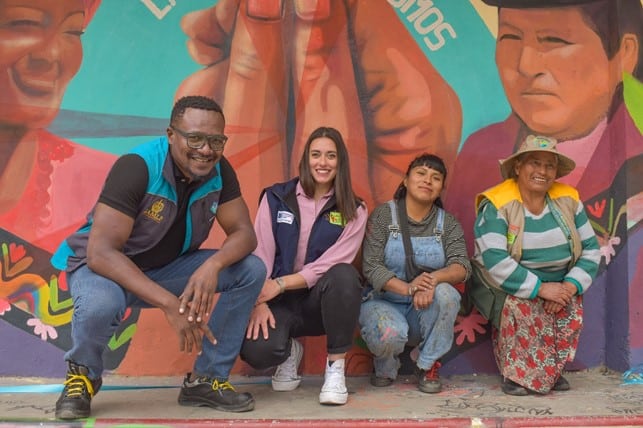
Conclusion : Encourager l’initiative pour un volontariat transformateur
Le volontariat en CES est une opportunité unique de contribuer au changement tout en développant ses propres capacités. En osant proposer des projets, les volontaires dépassent le cadre de leur mission initiale et deviennent de véritables acteurs de transformation sociale. Ces expériences montrent que le volontariat ne se résume pas à une simple action ponctuelle, mais qu’il peut être un levier de sensibilisation, d’inclusion et d’empowerment pour les populations locales.
L’ADICE continue de collaborer avec la Fundación Munasim Kullakita et recherche régulièrement des volontaires pour des missions d’engagement sur des thématiques sociales majeures. Ces missions offrent une opportunité unique de contribuer à un impact réel sur le terrain, tout en bénéficiant d’un accompagnement structuré et bienveillant.
À lire aussi
Corps Européen de Solidarité - volet Aide Humanitaire
Le CES volet aide humanitaire est un programme de volontariat d'échange de compétences et d'expertise proposé par l'ADICE.
En savoir plus
